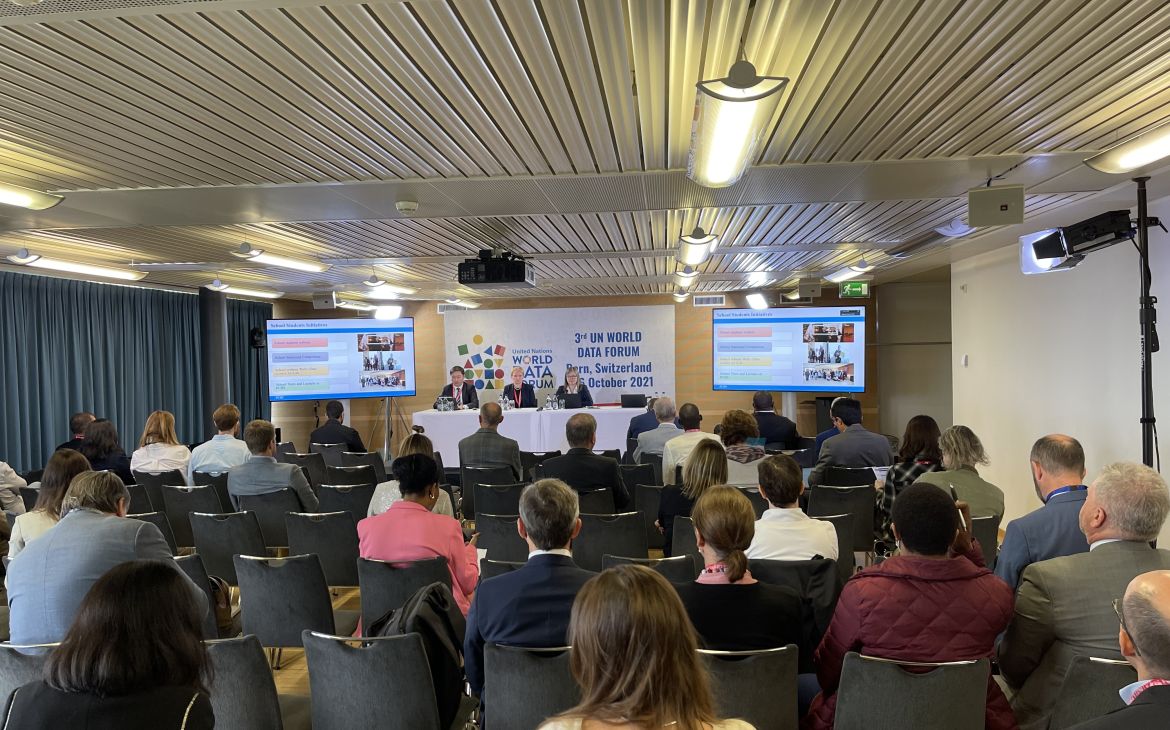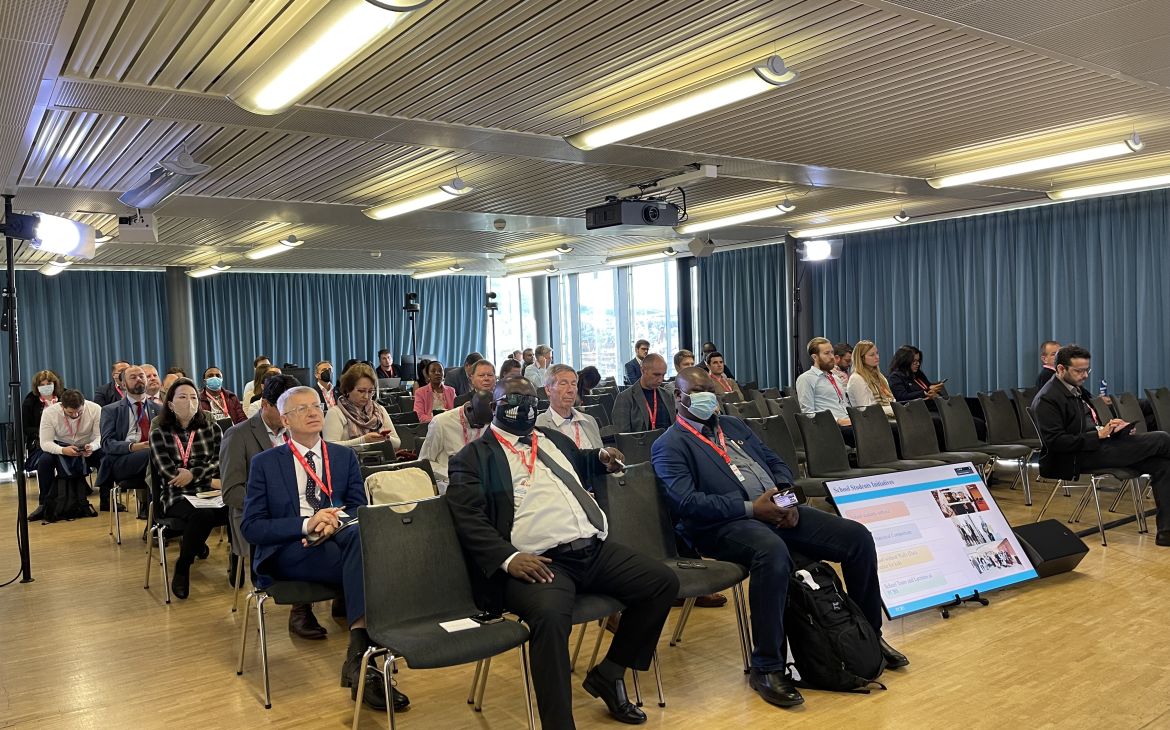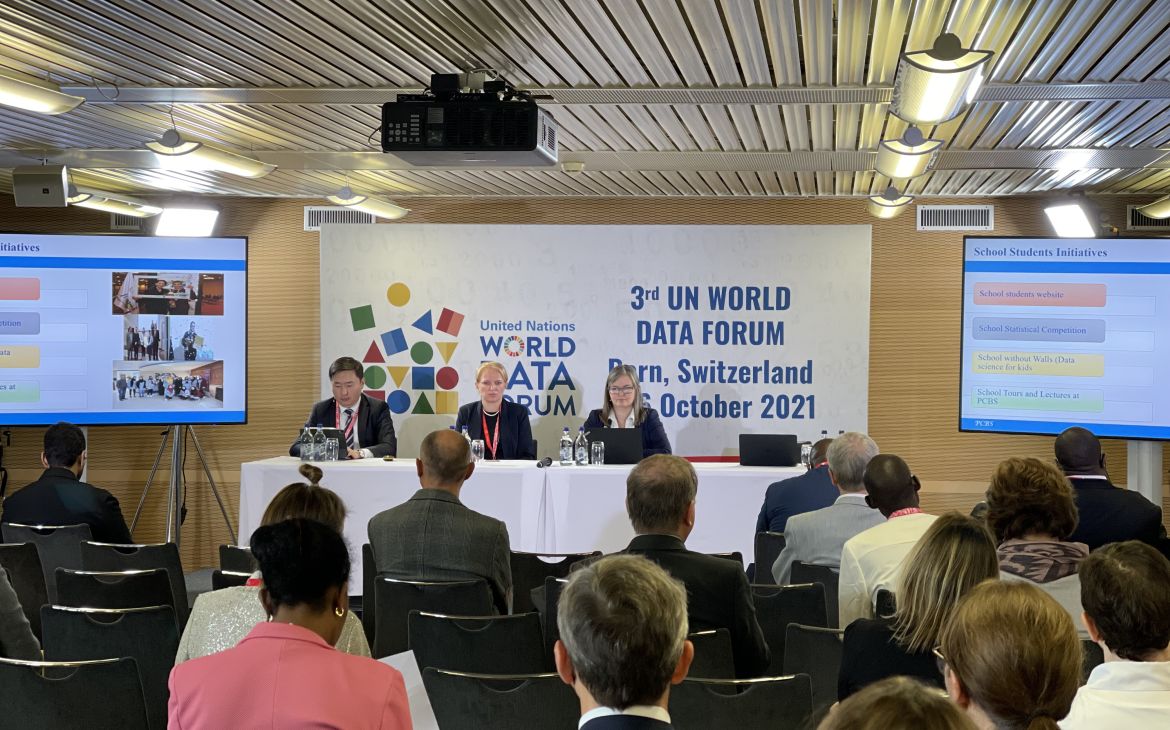21 October 2021, Geneva, Switzerland - During the 2021 World Data Forum (WDF), on the 6th of October 2021 in Bern, Switzerland, UNITAR, UN Statistics Division (UNSD) and United Nations Economic Commission for Africa (ECA) in collaboration with the Global Network of Institutions for Statistical Training (GIST), organized a hybrid session “Statistics and Data Smart: Innovative solutions for increasing statistical literacy of the general public”. Conversations focused on strategies and initiatives to improve statistical literacy of different stakeholders from children, journalists to policy-makers and business people as well as citizens at large and promote effective use of data in support of better societies.
This session was moderated by Ms. Vibeke Nielsen, an Inter-Regional Advisor at the UN Statistics Division, with an expert panel composed of members from National Statistics Offices (NSO), the International Association for Statistical Education (IASE), the UN Economic Commission for Africa, and UNITAR to discuss their efforts in making statistics more relevant and more engaging for different population segments, through the development of online products and content.
With the COVID-19 Pandemic, the use of statistics by news channels, governments or organizations has skyrocketed. Unfortunately, that trend also led to an increase in unreliable sources spreading unreliable data via social media platforms. In this context and with more than half of the world population actively using the internet, statistical literacy is more relevant than ever. The topic has been actively discussed for a longer period of time among members of the Global Network of Institutes for Statistical Training (GIST) and is the main focus of the work of one of the GIST Task teams.
The inaugural speaker of this session Mr. Batdavaa Batmunkh, Chairman of the National Statistics Office of Mongolia, started his intervention by reminding the attendees of the importance of statistical literacy in the current climate. Mr. Batmunkh then shared the Office’s journey to make the data and statistics more accessible to users. Several communication strategies were implemented and quickly showed impressive and promising results. A website centralizing statistical products was created and attracted more than 10.5 million visitors in 2021. Textbooks introducing simplified statistics reached up to 5000 downloads per month at their highest. In addition to large-scale awareness-raising campaigns, more comprehensive campaigns were launched to specifically target public servants, businesspersons, international organization workers or students and encourage them to use statistics on a regular basis.
Next, Mr. Husam Khalifa, Director of the External Trade Statistics Department at the Palestinian Central Bureau of Statistics (PCBS) who joined the panel online, presented the Palestinian experience with statistical literacy. Mr. Khalifa underlined initiatives nurturing student interest in statistics such as school competitions supported by the Bureau or even school tours. Other initiatives include the development of training to help journalists understand and use economic indicators. The “Data Matters Festival”, certainly one of the flagship joint projects of the PCBS and the Arab American University of Palestine (AAUP), aims to promote data science in Palestine.
These interventions were followed by Mr. Pedro Campos, former vice-president of the International Association for Statistical Education (IASE), currently Director of Methodology at Statistics Portugal and Deputy Director of the International Statistical Literacy Project (ISLP). Mr. Campos introduced the ISLP and its wish to make statistics more exciting, more approachable. To do so, every two years, the ISLP highlights innovative initiatives with the "Best Cooperative Project Award in Statistical Literacy". In 2021, the award went to the Russian Association of Statisticians for their project, TREND. The school competition in statistics was launched in 2017 and, thanks to the use of online technologies, allowed many children and teenagers from remote regions of Russia to participate and become more familiar with statistical knowledge and practice.
Mr. Léandre Foster Ngogang, Statistician at the African Centre for Statistics of ECA with a rich experience in the area of statistics, provided an insightful presentation on various strategies supporting the use of statistics and statistical literacy in Africa, especially in the field of journalism and education, and for the general public. Strategies include, for example, the training of journalists, highlighting data-driven journalism such as the Rwanda Data Journalism Award (RDJA) or research to understand how journalists use data to ensure the relevance of statistical products. For academics and teachers, facilitating access, knowledge and use of microdata and statistics for research and teaching is crucial – as exemplified with the data access center established by the national statistics office of Senegal at the Cheikh Anta Diop University of Dakar. Among students, statistical literacy can be promoted at the university level with competitions while other projects can help younger students become familiar with statistics with events like “Reading Data with Children” organized by the National Institutes of Statistics of Rwanda (NISR) and UNICEF. Data stories have become popular to increase statistical literacy for the general public.
The last intervenor of this session, Ms. Elena Proden, Senior Specialist for the Strategic Implementation of the 2030 Agenda Unit at UNITAR, presented the work by the Global Network of Institutes for Statistical Training (GIST) and, more specifically, that of the task team on statistical literacy. A new inventory is being launched to highlight an array of initiatives developed all around the world by the GIST members and other organizations in the area of statistical literacy for different types of users ranging from journalists, businesses, government to civil society as well as younger children. Ms. Proden also introduced the course “Understanding data and statistics better – for more effective SDG decision making” developed by UNITAR, UNSD and UNECA and available on the UN SDG: Learn platform. This self-paced course, accessible to all, is composed of 5 Modules aimed at strengthening the key data competencies of policy-makers needed to strengthen the effective use of data in public policy design, implementation, M&E.
A total of 257 people attended the session, of which 117 were online attendees. Join this community and learn more about worldwide efforts to make statistics more engaging.




